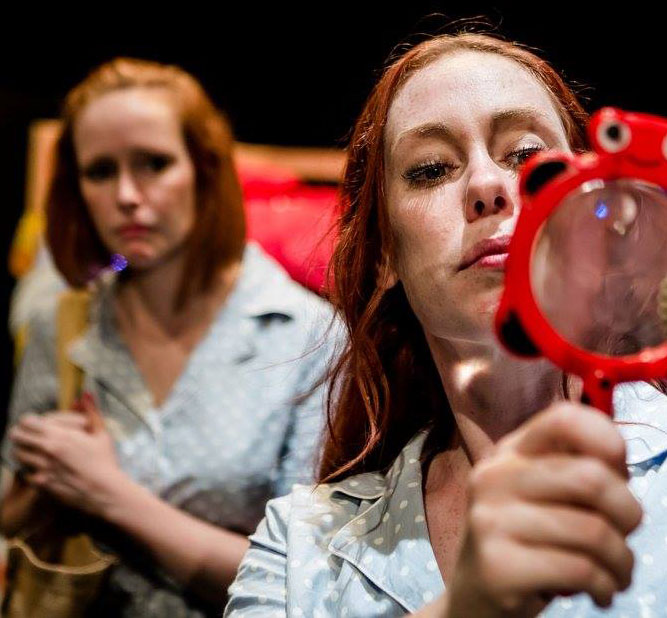
Based on interviews with ordinary folk throughout the UK, Leeds based Theatre Company The Paper Birds have constructed a snapshot-take on debt and its wider implications in early twenty-first century Britain. The first in a trilogy of works about class, Jemma McDonnell, Kylie Walsh and Shane Durrant have created a stream-of-consciousness drama that seeks to give voice to the silent victims of austerity.
The Paper Birds have recognised two big truths: firstly that debt is the vehicle by which financial establishments create new money. And secondly that we are all slavishly engaged in the perpetration of this act, but that some are paying a higher price than others. A recording of a child sharing his thoughts about the future and what he’d like to spend his money on makes what follows all the more poignant.
McDonnell and Walsh appear by turn within lit cubicles that look like enlarged mobile phone screens, each time speaking verbatim the recorded words of men and women of differing ages, usually expressing doubt for their futures and revealing a common river of financial stress running through the modern UK psyche. The stage direction has style, but at times I questioned whether its slickness prevented you from fully experiencing the quiet desperation of those it portrayed.
Using animation, projections, recordings and even hand puppetry to augment its theme, the play reminds us of the political history of debt, from its inception under William III to the pronouncements of Mrs Thatcher in her pomp, and beyond.
With atmospheric original music supplied by Durrant on keyboard and xylophone, McDonnell and Walsh play out a sequence of everyday scenarios, the most poignant perhaps being the scene at the supermarket check-out when a woman has to leave the shopping she has collected when her card is rejected. But it is when we get to a single mum’s lament that The Paper Birds project finally hits home.
‘Sally’ is one of the interviewees. There was something she said in her interview that is half-remembered as being a key statement. McDonnell and Walsh have cleverly choreographed themselves as interviewer and interviewee in a fast re-winding to find that moment. With a final pressing of ‘play’ Sally will finally confront us alone with a monologue about what being broke really means. The devices of the play have been stripped away here to allow some powerful, straightforward acting.
Close to the Ustinov you can hear the sound of tennis balls ‘pocking’ away in brightly lit and heated all-year membership-only courts. Serried ranks of the latest BMW’s, Audi’s and Mercedes are parked outside. Less than 500 metres away the Bath Food Bank operates out of the Manvers Street Baptist Church. The Paper Birds are right to tap into this dichotomy. ★★★☆☆ Simon Bishop 30/01/15

